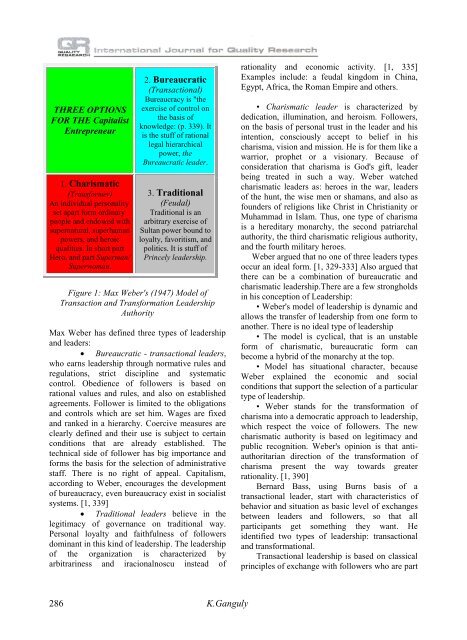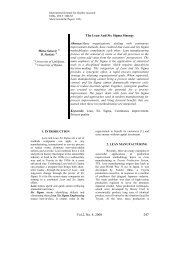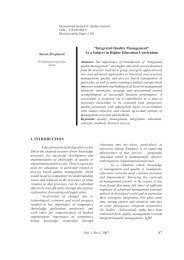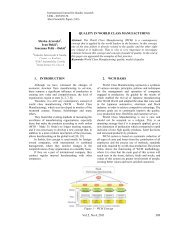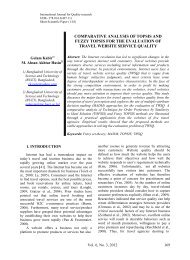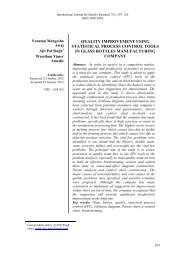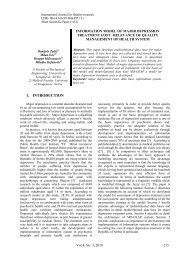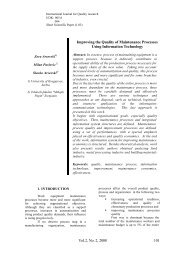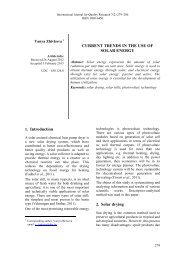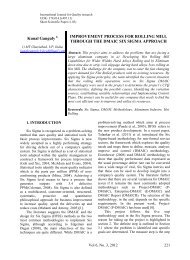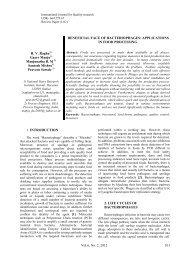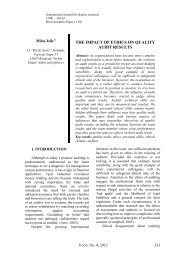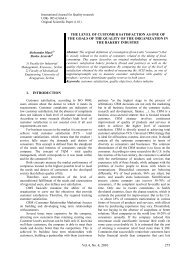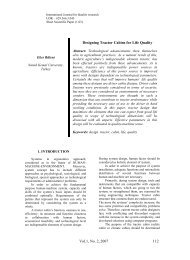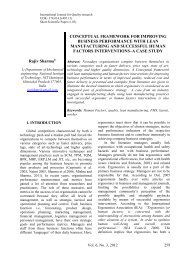transactional and transformational leadership - International Journal ...
transactional and transformational leadership - International Journal ...
transactional and transformational leadership - International Journal ...
You also want an ePaper? Increase the reach of your titles
YUMPU automatically turns print PDFs into web optimized ePapers that Google loves.
THREE OPTIONS<br />
FOR THE Capitalist<br />
Entrepreneur<br />
1. Charismatic<br />
(Transformer)<br />
An individual personality<br />
set apart form ordinary<br />
people <strong>and</strong> endowed with<br />
supernatural, superhaman<br />
powers, <strong>and</strong> heroic<br />
qualities. In short part<br />
Hero, <strong>and</strong> part Superman/<br />
Superwoman.<br />
2. Bureaucratic<br />
(Transactional)<br />
Bureaucracy is "the<br />
exercise of control on<br />
the basis of<br />
knowledge: (p. 339). It<br />
is the stuff of rational<br />
legal hierarchical<br />
power, the<br />
Bureaucratic leader.<br />
3. Traditional<br />
(Feudal)<br />
Traditional is an<br />
arbitrary exercise of<br />
Sultan power bound to<br />
loyalty, favoritism, <strong>and</strong><br />
politics. It is stuff of<br />
Princely <strong>leadership</strong>.<br />
Figure 1: Max Weber's (1947) Model of<br />
Transaction <strong>and</strong> Transformation Leadership<br />
Authority<br />
Max Weber has defined three types of <strong>leadership</strong><br />
<strong>and</strong> leaders:<br />
Bureaucratic - <strong>transactional</strong> leaders,<br />
who earns <strong>leadership</strong> through normative rules <strong>and</strong><br />
regulations, strict discipline <strong>and</strong> systematic<br />
control. Obedience of followers is based on<br />
rational values <strong>and</strong> rules, <strong>and</strong> also on established<br />
agreements. Follower is limited to the obligations<br />
<strong>and</strong> controls which are set him. Wages are fixed<br />
<strong>and</strong> ranked in a hierarchy. Coercive measures are<br />
clearly defined <strong>and</strong> their use is subject to certain<br />
conditions that are already established. The<br />
technical side of follower has big importance <strong>and</strong><br />
forms the basis for the selection of administrative<br />
staff. There is no right of appeal. Capitalism,<br />
according to Weber, encourages the development<br />
of bureaucracy, even bureaucracy exist in socialist<br />
systems. [1, 339]<br />
Traditional leaders believe in the<br />
legitimacy of governance on traditional way.<br />
Personal loyalty <strong>and</strong> faithfulness of followers<br />
dominant in this kind of <strong>leadership</strong>. The <strong>leadership</strong><br />
of the organization is characterized by<br />
arbitrariness <strong>and</strong> iracionalnoscu instead of<br />
rationality <strong>and</strong> economic activity. [1, 335]<br />
Examples include: a feudal kingdom in China,<br />
Egypt, Africa, the Roman Empire <strong>and</strong> others.<br />
• Charismatic leader is characterized by<br />
dedication, illumination, <strong>and</strong> heroism. Followers,<br />
on the basis of personal trust in the leader <strong>and</strong> his<br />
intention, consciously accept to belief in his<br />
charisma, vision <strong>and</strong> mission. He is for them like a<br />
warrior, prophet or a visionary. Because of<br />
consideration that charisma is God's gift, leader<br />
being treated in such a way. Weber watched<br />
charismatic leaders as: heroes in the war, leaders<br />
of the hunt, the wise men or shamans, <strong>and</strong> also as<br />
founders of religions like Christ in Christianity or<br />
Muhammad in Islam. Thus, one type of charisma<br />
is a hereditary monarchy, the second patriarchal<br />
authority, the third charismatic religious authority,<br />
<strong>and</strong> the fourth military heroes.<br />
Weber argued that no one of three leaders types<br />
occur an ideal form. [1, 329-333] Also argued that<br />
there can be a combination of bureaucratic <strong>and</strong><br />
charismatic <strong>leadership</strong>.There are a few strongholds<br />
in his conception of Leadership:<br />
• Weber's model of <strong>leadership</strong> is dynamic <strong>and</strong><br />
allows the transfer of <strong>leadership</strong> from one form to<br />
another. There is no ideal type of <strong>leadership</strong><br />
• The model is cyclical, that is an unstable<br />
form of charismatic, bureaucratic form can<br />
become a hybrid of the monarchy at the top.<br />
• Model has situational character, because<br />
Weber explained the economic <strong>and</strong> social<br />
conditions that support the selection of a particular<br />
type of <strong>leadership</strong>.<br />
• Weber st<strong>and</strong>s for the transformation of<br />
charisma into a democratic approach to <strong>leadership</strong>,<br />
which respect the voice of followers. The new<br />
charismatic authority is based on legitimacy <strong>and</strong><br />
public recognition. Weber's opinion is that antiauthoritarian<br />
direction of the transformation of<br />
charisma present the way towards greater<br />
rationality. [1, 390]<br />
Bernard Bass, using Burns basis of a<br />
<strong>transactional</strong> leader, start with characteristics of<br />
behavior <strong>and</strong> situation as basic level of exchanges<br />
between leaders <strong>and</strong> followers, so that all<br />
participants get something they want. He<br />
identified two types of <strong>leadership</strong>: <strong>transactional</strong><br />
<strong>and</strong> <strong>transformational</strong>.<br />
Transactional <strong>leadership</strong> is based on classical<br />
principles of exchange with followers who are part<br />
286 K.Ganguly


